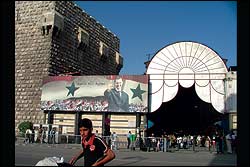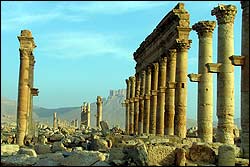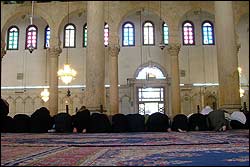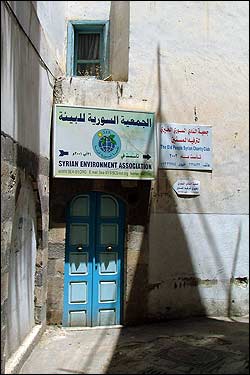
A month ago I had only impressions of Syria. In my media-influenced mind, I saw Syrians angry with the U.S. — for supporting Israel as it occupies the Golan Heights, for positioning military bases in Saudi Arabia and Kuwait, for starting a war that has inundated their nation with 1.2 million Iraqi refugees. When President George W. Bush added Syria to the “axis of evil” in 2002, I wondered how the insult sat with the country’s populace.
But in the part of my brain that wraps childhood memories in a hand-knit blanket, I coddled completely different impressions of Syria — the warm stuff that trickled, like honey in layers of philo dough, through four generations. My paternal great-grandparents immigrated to the U.S. from Syria’s predominantly Christian northwest mountains in the early 1900s, and while their language was lost to me, my family retained some of their religious and culinary traditions. In the personal realm, thoughts of Syria evoked my grandmother’s sweet Arabic bread and lemony dolmas, which she made with leaves from the grape vine in my grandfather’s garden and served at her Orthodox church.


 For years I had wanted to reconcile these two visions by visiting Syria, but fear froze me. Syria’s government is secular, but international human rights groups have criticized it for oppressing free speech and political expression. Would secret police detain and torture me? Would terrorists kidnap me? (Ironically, I didn’t have the same worries about visiting my mother’s ancestral homeland even though Ireland has seen more than a dozen terrorist attacks in the past 25 years and Syria about four.)
For years I had wanted to reconcile these two visions by visiting Syria, but fear froze me. Syria’s government is secular, but international human rights groups have criticized it for oppressing free speech and political expression. Would secret police detain and torture me? Would terrorists kidnap me? (Ironically, I didn’t have the same worries about visiting my mother’s ancestral homeland even though Ireland has seen more than a dozen terrorist attacks in the past 25 years and Syria about four.)
Months ago, a good friend of mine moved to Damascus to study Arabic. A journey to explore my heritage began to seem possible.
Around the same time, Syria began showing up in the news. Washington, it seems, is officially struggling over how to treat the country sandwiched between Iraq and the hard places of Lebanon and Israel. President Bush condemns Syria as a state sponsor of terrorism and has refused to talk to its leaders, yet the bipartisan Iraq Study Group recommended greater dialogue with Damascus. Between December and March, relations warmed considerably when Syrian President Bashar al-Assad met separately with the U.S. assistant secretary of state, several Republican congressmen and House Speaker Nancy Pelosi.
Suddenly, Syria had become enough of a buzzword that most Americans had now heard of it. And just as suddenly, it felt like time for me to go. I flicked off my fears, drew a sharp breath and booked a plane ticket.
Upon arrival in Damascus, I was promptly greeted by President Assad himself. His face — high forehead, small blue eyes under a slightly knit brow, narrow nose, trimmed mustache over a tight mouth and weak chin — was everywhere. Over the next two weeks I saw his likeness plastered on billboards, city walls, store windows, telephone poles. Assad airbrushed and looking concerned; Assad wearing a vacant expression behind aviator sunglasses; Assad toothy in an army cap; Assad waving in a business suit. One poster triangulated his mug with the smiling, disembodied heads of Iranian president Mahmoud Ahmadinejad and Hezbollah leader Hassan Nasrallah.
My buddy, whom I’ll call Reza, told me that while the Assad propaganda machine is always running, it was on steroids leading up to the “presidential election” scheduled for May 27. (International media described the event more accurately as a referendum, only offering voters the option to vote “yes” or “no” on Assad’s inevitable second seven-year term, with no opposition candidate.)
The posters bore handwritten phrases, which tended toward the emotional rather than the practical. “Dear leader, we love you!” “From the heart, Yes!” and so forth, with no mention of policies or promises. I couldn’t read the Arabic newspapers, but the graphics got the message across. Page after page carried photos of crowds rallying for Assad; Assad smiling with his wife; a portrait of Assad in front of a Syrian flag-colored thumbprint, symbolizing a vote.
I tried to imagine Bush-Cheney ’04 posters with W’s face in the center of a heart, surrounded by the slogan “Beloved leader! Yes, yes, YES!”
Bashar al-Assad assumed the presidency in 2000, succeeding his father, Hafez, who had ruled from his post-coup “election” in 1971 until his death in June 2000. Hafez’s secular socialist regime was known for bloody repression of political opponents, especially Muslim fundamentalists; enmity with neighbors Israel and Iraq; and the occupation of Lebanon, which the U.S. permitted as a tacit reward for Syria’s aid in the Gulf War.
Bashar, a British-educated ophthalmologist, was groomed for the presidency after his older brother Basil died in a suspicious car crash in 1994. After his father’s death, Bashar freed hundreds of political prisoners and pledged to modernize the country, prompting some Western pundits to speculate he’d lead Syria toward democracy. Subsequent crackdowns on political dissidents soon quashed that hope.
After hearing from several locals that “there are eyes and ears everywhere,” I kept my own conversations and emails sanitized of subjects such as sex, drugs and politics.
The many foreigners living in Damascus — I met mostly Europeans studying Arabic, a few Asians and only two Americans — rolled their eyes at the speech restrictions but seemed to adhere to them, or at least to approach risky topics in hushed voices. A young Spanish woman interning with the U.N. refugee office joked that the taboos left her with nothing interesting to discuss with her Syrian friends — just the weather, food, family and Allah.
Though it limited the scope of our conversations, the avoidance of politics also took the bite out of potentially tense interactions. No one asked about our religions; and if we offered that Reza’s family is Shiite Muslim and mine Orthodox Christian, our Syrian acquaintances would wave their hands dismissively. “It doesn’t matter, it doesn’t matter,” one shop owner said. “There are Shiites, Sunnis, Alawis, Druze, Catholics and Orthodox in this country, but we’re all Syrians.”
Most locals flinched, if only for an almost imperceptible moment, when Reza and I said we were Americans. Then they’d honey over the tension by pressing glasses of sugary tea into our hands, smiling, and saying, Ahlan wa sahlan — “Welcome, and be comfortable.” The closest anyone came to sharing his opinion on our nationality was a man who clapped Reza on the shoulder and said with a grin, “Amrika yes, George Bush no.” We agreed, and he offered us a bag of apples.
How lucky, I thought in an oddly timed burst of patriotism, that I can say this about my president.
Syria’s crumbling Byzantine pillars and Crusade-era castles brought the cliché to mind: “When in Rome … ” So like a good Syrian I banished inevitably depressing politics from my thoughts. I also shook off worries of theft and violent street crime, which are virtually nonexistent, and enjoyed my time as a tourist.
I’d always imagined Syria, about three-fourths the area of Oregon, as desert country. The nation’s larger eastern area is indeed parched, with an eerie rosy-tan beauty most poetic at dawn. But like Oregon west of the Cascades, much of the land north and west of Damascus is green, mountainous and fertile. For a few days we were heartily rained on.
Syria’s hot tourist spots, the Crusade-era castles and Roman ruins, stand as testaments of the country’s historic shuffle from one imperial ruler to the next. In Bosra, the ancient capital of Roman Arabia, we saw the amazingly well-preserved 1,900-year-old amphitheater where, it’s rumored, Christians were fed to lions — until 312 AD, when Roman emperor Constantine had a change of heart and became a believer himself. In Palmyra, we trekked up a barren peak to a castle overlooking the eroding Roman pillars and arches of an ancient market. And we marveled at the man-made channel carved into one side of the Salah al-Din Citadel, a Crusader castle north of Latakia.
The historic mixing of indigenous and imperial peoples — Phoenician, Bedouin, Roman, Ottoman, French — results in today’s multifaceted Syria. The coastal mountain town of Kesseb is home to as many Armenians as Arabs, with Catholic and Orthodox churches nestled into the green slopes alongside mosques. Elsewhere in Syria I saw members of several Christian sects and various branches of Islam coexisting peacefully, lending the country an unexpected cultural richness.
Syria’s geographic diversity also gave it an unexpected beauty. In the Qalamoun Mountains north of Damascus we gawked at the 1,500-year-old Christian Mar Musa monastery, whose orange-stone masonry camouflaged its position on a cliff over a desert gulley. Trips to the beach brought us wildflowers, sharp crags softened by fog, smooth-pebble beaches and turquoise Mediterranean waters. My shutter-finger was in overdrive, and I kept thinking, “Who would’ve known this is Syria?”
Just as we began to forget about the messy business of governing nations, politics went and messed up our travel plans.
As I lay vomiting (musta been the water) in a hotel bed in my great-grandmother’s green, mountainous hometown of Mashta al-Helou, Reza mapped our vacation route. We couldn’t go to Israel (which Syrians call Palestine) since the Syrian border patrol wouldn’t let us back in if we had Israeli passport stamps. But we could aim for the coast, then dive south through the Lebanese border to Biblos, Tripoli and Beirut, finally taking a bus back to Damascus.
Inshallah, Reza added, a habit he had adopted since living in Damascus. It means “God willing,” and Syrians tend to tack it onto the end of any statement in the future tense.
I recalled a line in Reza’s Lonely Planet about unexploded land mines in Lebanon. “Are you sure it’s safe?” I asked.
“Oh yeah. We’re going to the north; there hasn’t been any fighting there since independence in the 1940s,” he assured me.
Outside, patriotic music blared at rock-concert volume through speakers in the town square. The election-week celebration would continue for about four hours, the sound waves roiling my gut.
Reza padded into the living area and turned on Al Jazeera English. Now the rat-a-tat of guns on the TV synched with the music outside, and through the chartreuse veil of nausea, I heard the news that a group of gunmen calling themselves Fatah al-Islam, based in a Palestinian refugee camp near Tripoli, had robbed a bank, taken over a building and exchanged fire with the Lebanese army. The next day the Lebanese began shelling the refugee camp and closed the border with Syria.
Allah, we supposed, was not willing. Faith in God, Reza theorized, contributes to many Syrians’ willingness to accept the status quo: Allah, not the individual, is in control. That faith compounds with the sheer age of Syrian civilization to create a strong hegemony — the sense that things are as they are because that’s the way they’ve always been. It’s a sharp contrast to centuries-young American culture, which holds sacrosanct the notion that citizens can make change. Tourist literature claims Damascus as the world’s oldest continuously inhabited city, dating back some 4,000 years.
Walks through urban streets revealed endless juxtapositions: the ancient and modern, traditional and globalized, conservative and liberal, alternately romancing and repelling my Western sensibilities. I tried not to judge as I took it in: Circles of light falling through holes left by French artillery in the roof of the historic marketplace. A group of fully veiled women at a lingerie store, one of them asking the price of a strappy red leather getup. A brown-eyed child standing in a cloud of noxious smoke as a trash heap burned on the sidewalk.
From an environmental perspective, Syria both appalled and impressed me. Garbage, much of it plastic, littered the countryside and burned in the open. Cigarette smoke filled restaurants and buses, diesel fumes choked city streets and the once-mighty Barada River sludged through a concrete channel. When I told vendors I didn’t need a bag, they insisted on giving me one anyway. Reza translated one vegetable seller’s explanation: “If you walk away from my store with the lemons in your hands, the neighbors will say, ‘Look, he doesn’t take care of his customers.'”
Yet I also saw the eco-logic inherent in poverty. Many apartments featured open-air courtyards with no central heating or air conditioning and few electric appliances. (Think laundry lines.) A majority of people crammed into buses, mini-buses and trains to get around. There were virtually no fast food franchises junking up commercial districts though Reza told me Damascus recently welcomed its first KFC. I got the general impression that Syrians have fewer toys than Americans — one exception being “Fulla,” the Muslim world’s Barbie, with her extensive wardrobe of modest clothes. And I was happy to see evidence of local environmental groups working for change: the Syrian Environment Association office in Damascus, an agro-biodiversity movement in Sufita and Syrian Society for the Conservation of Wildlife posters in the Mar Musa monastery.
A part of Syrians’ national identity is tolerance of cultural diversity, a dynamic most obvious in women’s dress. I saw a few conservative Muslim women in black abayas, their faces completely obscured by matching veils, and more frequently, ladies with hejabs over their hair and loose clothes from neck to ankle. Then there were the college students who paired their headscarves with stylish, form-flattering business suits and long denim skirts and uncovered women — generally assumed to be Christian, Druze, Alawi or foreign — in tight blouses and butt-gripping stonewashed jeans. All females seemed to adhere to Syria’s unofficial dress code: no bare shoulders, bellies, backs or legs above the knee. It struck me as a bit restrictive on hot days when I was tempted to sport a tank top, but relative to fundamentalist Muslim countries, Syria’s quite liberal. Too much skin may be frowned upon in Syria, but it’s not criminalized.
The genders seemed integrated in most aspects of Syrian society, sharing company virtually everywhere but in mosques and bath houses. I was rattled by one exception: a rooftop café in Damascus that sequestered women behind a wall while men enjoyed fresh air on the balcony. My male friends encouraged me to join them at their table — an unusual but permissible move, they said, because I am a foreigner. I felt conspicuous and a bit rebellious, but the waiters were courteous. Reza’s Syrian buddy was only mildly shocked when I paid for my own coffee.
I felt helpless at times, with only a couple dozen badly butchered Arabic words in my vocabulary and an infant’s understanding of the culture. When I took people too literally, Reza reminded me that Syrian customs are inherently melodramatic. A man might greet a casual acquaintance with phrases as gushy as “Dear one! My eyes, my heart, my head!” I watched Shiite women make sobbing sounds at the tomb of the Imam Ali’s daughter Zaynab, and then turn around dry-eyed and call to their children. And when strangers beckoned, inviting me to sit and eat with them, Reza instructed me to respectfully decline. They were just being polite, he explained.
The line between the language and the law became literal as Reza and I started down a steep path to a beach near Kesseb. A Syrian policeman emerged from his concrete station and warned us not to explore a come-hither stretch of coast about 150 yards away. “That’s Turkey. It’s forbidden,” he said.
We were right on the edge of the Hatay Province, a mitten-shaped chunk of land that includes the historic city of Antioch, which France carved off like a cut of colonial sirloin and gave to Turkey in 1939. The general Syrian public still refuses to accept the loss; in fact, most Syrian maps show the province to be within national boundaries. Yet here was a Syrian policeman warning us not to enter the Turkish beach — a de facto acknowledgement of a border that patriotic pride denies.
Syria may be full of contradictions, but the country’s demographics also hold a mirror to American hypocrisy. Millions of refugees from U.S.-funded occupations now live in Syria — albeit as second-class citizens — while America refuses them entry. According to the U.N., Syria has taken in roughly 400,000 of more than 2 million Palestinian refugees and 1.2 million of more than two million Iraqi refugees. By comparison, the U.S. has allowed entry to about 800 Iraqis since the start of the Iraq War in 2003, though the State Department recently announced plans to bump the number up to 7,000, and too few Palestinian refugees for the U.N. to bother counting.
And while America criticizes Syria for allowing torture in its prisons — never mind Abu Ghraib and Guantánamo — in 2002 U.S. officials shipped Canadian software engineer Maher Arar to a Syrian prison precisely in order to be tortured. He was held there for a year though suspicions that he was involved in terrorist activity proved to be unfounded.
Bashar al-Assad won the recent “election,” of course, with some 97.6 percent voting “yes,” a quarter-million casting invalid ballots and a ballsy 0.2 percent voting “no.” Syrian officials claimed that 95 percent of the nation’s 12 million voters turned out, but U.S. State Department spokesman Tom Casey took a sarcastic tone, saying, “I’m sure President Assad is basking in the glow of his ability to have defeated exactly zero other candidates.”
An unspeakable quote in Syria, but this is America, where we’re allowed to say that kind of thing. As soon as I passed through passport control at the San Francisco Airport, I couldn’t resist exclaiming — not crazy-loudly, but audibly — “George Bush sucks!”
Men in uniform did not swoop down on me. Heads didn’t even turn. I felt giddy with love for my country.
EDITOR’S NOTE: National award-winning reporter Kera Abraham, who has a master’s degree in journalism from UO, left EW in January to join the staff at Monterey County Weekly. The California paper printed a shorter version of this story June 7.